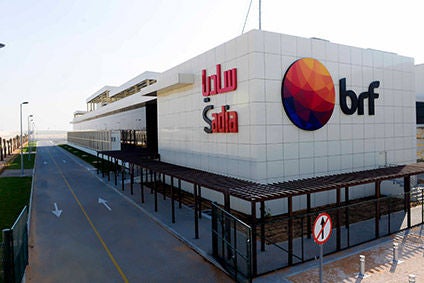
Brazil’s BRF has set a target to triple the meat processor’s sales revenues over the next decade by focusing on valued-added growth areas such as plant-based proteins and ready-meals, both domestically and internationally.
Publicly-listed BRF is aiming for BRL100bn (US$19.5bn) in revenues between 2027 and 2030, to be achieved in stages, from the BRL33.45bn reached in the fiscal year to 30 September. And it also seeks to boost EBITDA by 3.5 times from the most recent annual print of BRL5.3bn and increase profit margins from 15.9%.

Discover B2B Marketing That Performs
Combine business intelligence and editorial excellence to reach engaged professionals across 36 leading media platforms.
BRF’s CEO Lorival Luz said in a statement ahead of an investor event held yesterday (8 December) the company is about to embark on “a new growth cycle over the next decade”.
He continued: “We intend to further establish ourselves as a global food company with high added-value, with a portfolio of strong brands and increasingly practical, tasty, high quality and reliable products whenever our clients and consumers want, wherever they want and however they want. Our intention is to operate sustainably, taking the main lead and being agents of transformation.”
During the first phase of the plan, from 2021 to 2023, the Sadia and Banvit brand owner will seek to improve productivity and production efficiencies, with a target to achieve revenues of BRL65bn and to double EBITDA from September levels.
“BRF aims to achieve a local presence in some of the world’s largest added-value consumer centres, and to expand its share in ready-meals, increasing its presence in the promising high-added value pork and pet [food] markets, in addition to leading the biggest transformation in this generation’s consumption of new proteins,” the statement read.

US Tariffs are shifting - will you react or anticipate?
Don’t let policy changes catch you off guard. Stay proactive with real-time data and expert analysis.
By GlobalDataBetween 2024 and 2026, the company expects to “have a more optimised capital structure” when revenues and EBITDA are anticipated to be 2.5 times the levels reached last September.
In the final stage up to 2030, BRF said it will “enter a maturation phase of most initiatives and accelerate gains of economic value and continued investments”. By that time, the company expects value-added products to make up 70% of its portfolio. Margins should remain north of 15% with a return on invested capital (ROIC) of about 16%, it said.
The meat processor has set an ambition in Brazil to be the leader in ready-meals within its “2030 Vision”, a market it estimates will reach BRL16bn in the “coming years” based on current consumption trends.
Growing internationally is also on the agenda. Its overseas sales amounted to BRL14.9bn in the year to 30 September, while BRF holds a 12% share of the global poultry market. The company supplies to 130 countries, with five plants outside of Brazil and 34 in its home market.
“Expanding [our] international presence with local participation and relevance in some of the largest added-value consumer centres in the world is also a high point in the company’s strategy,” BRF said. “The goal is to access markets that represent two-thirds of global consumption.”
On an analyst call in November, CEO Luz said BRF has “adequate capacity,” but he noted this week the company intends to invest around BRL55bn in the business over the ten years.
Innovation will also play a key part. In its 2019 annual report for the period through September, BRF said new product development made up 3% of revenues and it aims to increase that share to 10% by 2023. It launched 170 new SKUs during the 12 months.
In the plant-based area, where BRF already markets products under its Sadia Veg & Tal brand, BRF said it “expects to take a leading position in the market for meat substitutes”, where the “greatest food industry transformation is expected”.
“This nascent industry has the potential to achieve more than BRL13bn [in revenues], and it is expected that BRF will have the capacity to speed up and lead this food evolution.”





